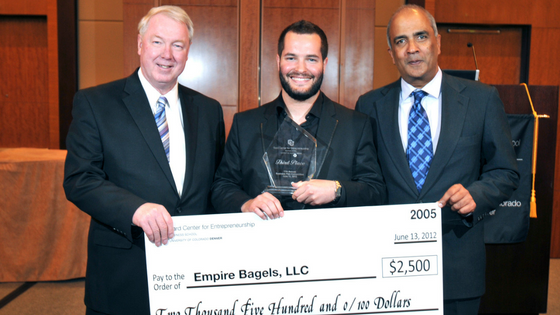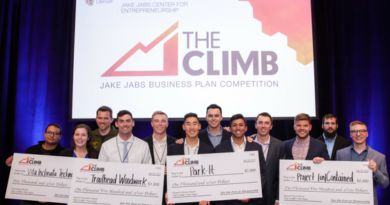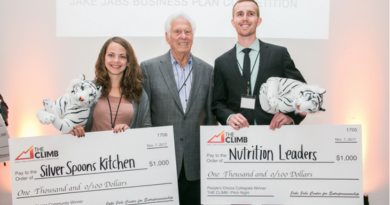THE CLIMB Success Story: Q&A with Rosenberg’s Bagels
If you’re living in Denver, you’re probably familiar with a restaurant named Rosenberg’s and its addictive bagels baked with replicated New York water. Yes – we said New York. That’s how passionate CEO and founder Joshua Pollack is about making an authentic New York bagel in the Colorado Front Range. But did you know how these bagels came to be?
Rewind to 2012, when Pollack enrolled in entrepreneurship courses as part of the Jake Jabs Center for Entrepreneurship’s certificate program. He learned about THE CLIMB through professors, originally competed under the name “Empire Bagels,” and won second place. Fast forward to 2018, where Rosenberg’s has become a household name and lunch staple for Denverites. Pollack sat down with the Jake Jabs Center team to reflect on his journey from student to “The Bagel Dude”:

Q: So Joshua, how did you hear about THE CLIMB | Business Plan Competition when you were a student at CU Denver? What made you want to apply?
JP: One of the classes I took as part of my entrepreneurship certificate program was Business Plan & Model Development with MP (a.ka. Dr. Madhavan Parthasarathy, Jake Jabs Center Executive Director). Both he and guest speakers in class encouraged us to apply – I felt like I connected with several of them and a few had also gone through the competition themselves. I’m a naturally competitive person, so of course I want to go in wanting to win something, but I went in mostly for the experience. It was another way for me to fine-tune my business plan, actually pitch it to people and get honest feedback before I went to the bank, investors or venture capital firms. Working through THE CLIMB process helped me answer all of the tough questions about my business before it was too late.
Q: What did you do to prepare for THE CLIMB?
JP: I practiced a lot with my wife. I’ve taken a public speaking course in the past and feel fairly comfortable in front of crowds, but I tend to ramble and take too much time on things or I say “um” too much. So I think practicing over and over again allows you to really adjust the discrepancies. The Business Plan class helped me prepare for THE CLIMB as well. We had to prepare multiple versions of our business plan, including an elevator, 3-minute, 10-minute and a full pitch, and we also had to cater the pitch to different audiences. You might be standing next to someone waiting in line and realize “They’re the CEO of ‘X company’ who might be able to change my life.” You see this happen in movies and on TV, but these opportunities do come up when you least expect them, so you have to be ready.
I also spent a lot of time in office hours with my professors, and the classes I took prepared me the most for THE CLIMB. For example, I took entrepreneurial finance and worked with my professor to fine-tune the financials for my business plan. My actual passion and in-person experience also helped me prepare. At the same time I was getting the entrepreneurship certificate, I was going to a culinary academy to learn about baking and traveling to New York to bring back water samples to test for the bagel recipe. I was making bagels in my apartment, which was covered in seeds, and broke three stand mixers in the process.
Q: How did THE CLIMB further your career/startup goals and help you make Rosenberg’s what is is today?
JP: We all have visions of what our businesses might look like, but until you put it down on paper and can analyze it, it’s not a reality. THE CLIMB gave me the tools and resources I needed to start Rosenberg’s. The whole reason I went back to CU Denver was for this reason. Before Rosenberg’s, I had two businesses (a live-event production company and medical marijuana growing company), but they didn’t take off like I had hoped. Both were profitable, yet they weren’t I wanted to spend the rest of my life doing.
I won $2,500 plus in-kind prizes. With the money, I went to New York City, used it toward living expenses and worked for a couple months at bagel shops. The in-kind prizes were incredibly valuable as well. I received $1,500 worth of legal services, four sessions with a branding expert and accounting services. The attorneys helped me research and set up trademarks, while the accounting services allowed me to set up general ledgers for my business. The branding expert helped me refine the original name, Empire Bagels, to Rosenberg’s, which is a family name that sounds like an old New York Jewish deli.
The other way THE CLIMB helped my career was also through networking. I got to meet one of the judges who was the original owner of Galvanize, and he told me they were opening up a café in one of their Denver locations. That’s where I got to cut my chops, and ended up housing Rosenberg’s out of their café for two years while I was looking for my brick and mortar.
Q: So why bagels? What inspired you to start this company?
JP: It’s actually something that MP taught in his Business Plan class…he always asked us: “What is entrepreneurship?” It’s finding a need that’s not being served. Knowing what a good bagel is, I knew that Colorado didn’t have good bagels and needed them. So Rosenberg’s was born.

Q: What was the biggest challenge or obstacle you’ve had to overcome for Rosenberg’s?
JP: So the fire we had was a big one, but I don’t think it was the biggest! Staffing is really hard. I’m extremely passionate about food and hospitality, but it’s been difficult to either teach that aspect of the business to people or attract people who share in that passion. It’s also an extremely competitive work environment right now with new restaurants popping up left and right, and it’s hard to retain talent. The restaurant industry as a whole is experiencing this problem. That being said, we’ve built a great core team here so far, and we’re very lucky to have who we have. (Shameless plug: If you want to work for Rosenberg’s, apply here!)
Q: How did you go about securing capital for your company?
JP: My first job out of college was a financial sales job where I cold-called people and sold them IRAs. My boss at that time taught me more than anyone I’ve ever worked for. He used to make us come in on Saturdays and make cold-calls wearing suits. While I hated him at the time for making us do this, it was incredibly valuable. He taught us customer service, empathy, and that people can tell if you’re smiling over the phone. He would even say “Every no is just one more no until your next yes.” This sales training made my quest for funding easier because I wasn’t getting discouraged by the turn-downs.
MP also taught me how to cater different parts of my business plan to different people’s needs. The ‘passion story’ is what you’re going to pitch to family and friends. For the bank and investors, you’ve got a version that has the passion element to it, but your numbers are rock solid. Understanding who you’re pitching to and what they want was a really good lesson. I learned early on that venture capital was not the way I wanted to go. You also need to know what YOU want. Do you want to sell your company for a lot of money one day? You probably shouldn’t be giving up any equity. Do you want do this for the rest of your life and be a lifestyle entrepreneur? Maybe you want to bring in a partner who shares in your vision. Understand that raising money is a sales pitch.
By the time I almost had almost all of my funding done (I got denied bank loans), I decided to utilize resources from the city. Denver has an amazing amount of resources for entrepreneurs, such as the Office of Economic Development and the Small Business Development Center of Denver. I got a grant and picked a location that was an enterprise zone. I bootstrapped. You cut costs as much as you can. But eventually, once your concept is proven, you can go back to those banks. The Small Business Association program is a great way to get funding from banks. Be sure to utilize all these free resources. As a student, you also have a ton of resources at CU Denver, with THE CLIMB being one of them. The SBDC and OED were my biggest allies. I probably received over 100 hours of free consulting with them.
Q: What advice do you have for people who want to apply for THE CLIMB and don’t know where to start?
JP: Start with what you’re passionate about. If you want to own your business of any kind or just want to fine-tune a skill, THE CLIMB a great opportunity. If you’re a current Business School student, take the Business Plan class. It will tee you up for success and you can use THE CLIMB as a goal to work toward. I couldn’t have asked for a better experience!




